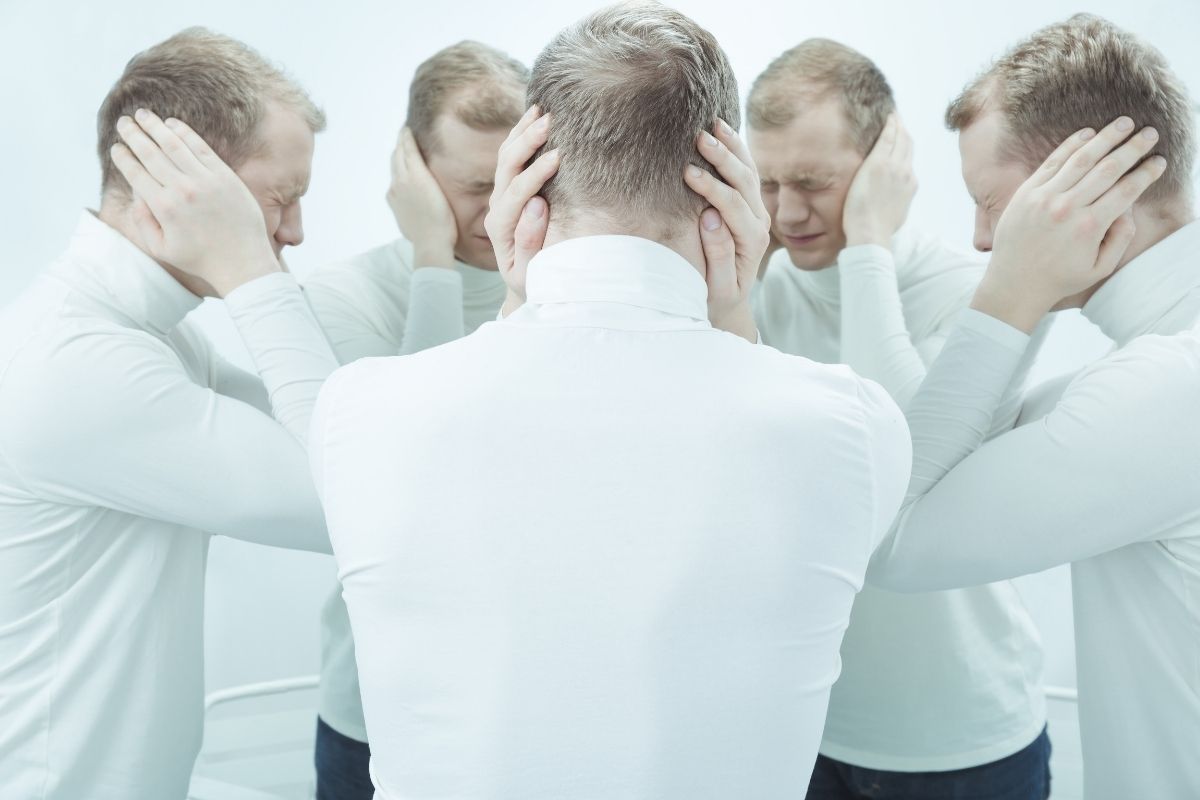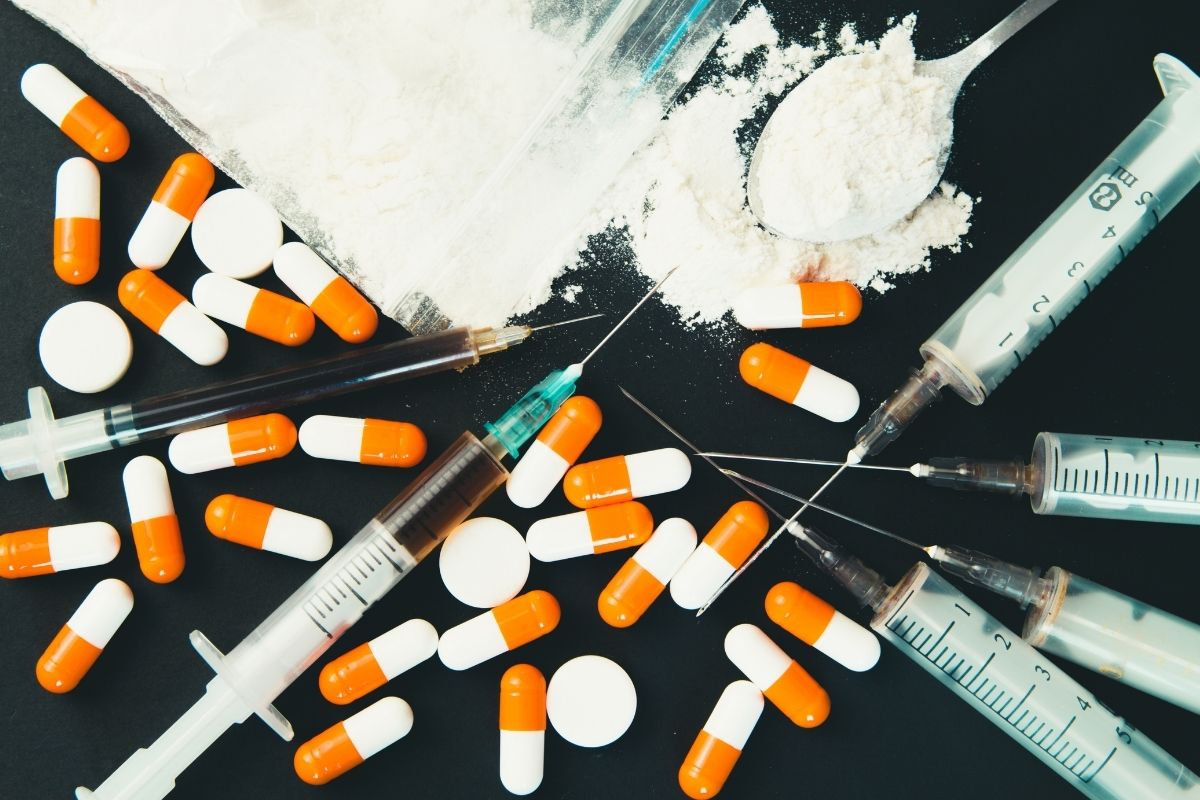Drug abuse is well known for causing several problems and leading to an array of mental health conditions or worsening already existing mental health conditions.

We all know the physical dangers of abusing drugs but sometimes, the psychological effects are overlooked or not known about.
One of the most serious mental health conditions is schizophrenia and for many years, people have wondered if drug abuse can lead to this condition.
The short answer is yes, schizophrenia can be caused by drug abuse but there are so many factors to be considered and this can often be confusing.
We’ve created this article to clear up the confusion. We’ll look at what the condition is, how it is caused and whether drug abuse can play a role in this mental health condition.
What Is Schizophrenia?
Before we move on, it’s best we clear up what this condition is.
Schizophrenia is a psychiatric disorder that affects around 1% of the population. It’s also known as ‘split personality’ because sufferers typically experience two different personalities.
The main symptoms include hallucinations (seeing things that aren’t there), delusions (believing something isn’t true) and disordered thinking.
Schizophrenia is very difficult to diagnose and treat. There is no cure, but medication can help manage some symptoms.
How Does Schizophrenia Develop?
There are various theories about how schizophrenia develops. Some believe it’s due to genetic factors while others believe it’s due to environmental factors.
There are three main types of schizophrenia: paranoid, undifferentiated and catatonic.
The first type involves paranoia and delusions and the second type includes both hallucinations and delusions.
Paranoid schizophrenia is thought to develop when a person has a predisposition toward developing the condition.
This means they may have a family history of schizophrenia or other mental health issues.
Catatonic schizophrenia is usually seen in young children and adolescents.
These patients have a rigid body posture and do not respond to their environment. They’re often withdrawn and unresponsive.
Undifferentiated schizophrenia occurs when a patient experiences psychosis without any specific features.
Causes Of Schizophrenia
It’s important to note that schizophrenia is not one disease but rather a group of disorders with similar symptoms.
As such, it can be hard to pinpoint exactly which factor causes schizophrenia.
Some researchers believe schizophrenia is caused by a combination of genetics and environmental factors.
Genetics
Some studies show that schizophrenia runs in families. If you have a parent who has schizophrenia then your risk of having the condition increases.
If you have a close relative with schizophrenia then your risk of getting the condition increases even more.
Environmental Factors
Other studies suggest that schizophrenia is triggered by an event in life. For example, a traumatic event like being sexually abused can trigger the condition.
Other environmental factors include substance abuse, stress and malnutrition.
Drugs And Schizophrenia
Regarding drugs and schizophrenia, most people think cannabis use leads to schizophrenia.
However, research shows that cannabis use doesn’t increase the chance of developing schizophrenia.
Cannabis use can however lead to psychotic episodes in those already predisposed to schizophrenia. In fact, cannabis use can worsen existing symptoms of schizophrenia.
Alcohol is another commonly-used drug that can cause schizophrenia. A study found that alcohol consumption increased the risk of schizophrenia by 50%.
Alcoholics tend to have a higher rate of schizophrenia than non-alcoholics. In addition, heavy drinkers are at greater risk of developing the condition.
The evidence suggests that smoking marijuana does not increase the risk of developing schizophrenia. It can however make existing symptoms worse.
How Do Drugs Cause Or Affect Schizophrenia?
Schizophrenia is a complex disorder that affects many parts of the brain. Many neurotransmitters play a role in its development.
Neurotransmitters are chemicals that transmit messages between cells. They help regulate mood, emotions and behavior.
Neurotransmitter systems include dopamine, serotonin, norepinephrine and gamma-aminobutyric acid (GABA).
Dopamine plays an important role in regulating movement, motivation and pleasure. Dopamine levels are low in people with schizophrenia.
Serotonin regulates sleep, appetite, mood, sexual desire and pain sensitivity. Serotonin levels are also lower in people with schizophrenia.
Norepinephrine helps control blood pressure, heart rate and breathing. Lower levels of norepinephrine have been associated with schizophrenia.
Gamma-Aminobutyric Acid is involved in controlling seizures, anxiety and sleep patterns. GABA levels are also lower in schizophrenic patients.
When people use drugs, they impact the balance of these chemicals in the brain which can cause misfiring or incorrect communication between the neurotransmitters.
Things like dopamine can become overwhelming in the brain creating things like confusion or delusions.
As a result, mental health conditions can occur and one of these is indeed schizophrenia.
Dual Diagnosis

It’s difficult to pinpoint sometimes if schizophrenia was an already established condition when it comes to diagnosing people who abuse drugs.
Doctors debate whether the patient already had the condition before abusing drugs which may or may not have exacerbated the condition, or if drugs played the primary role.
In reality though, it doesn’t matter too much as doctors and other professionals will work with the patient to treat both the drug dependence and mental health condition.
This is not uncommon for places such as residential rehab centers.
What Are The Symptoms Of Schizophrenia?
People experiencing psychosis often experience hallucinations, delusions and/or disorganized thinking.
Hallucinations are perceptions that aren’t real. These could be auditory, visual or tactile.
Delusions are false beliefs that someone has about themselves, others or the world around them.
Some examples would be hearing voices telling you to hurt yourself or believing your partner is cheating on you.
Disorganized thinking refers to having problems organizing thoughts into logical sequences.
People may find it hard to follow instructions or keep track of what they’re doing.
The severity of each symptom varies from person to person. However, there are some common characteristics among all types of schizophrenia.
Hallucinations
Some people hear voices talking to them. Others see visions of things that don’t exist.
Delusions
Someone might believe that their body is possessed by evil spirits. Or they might think that someone else is trying to harm them.
Disorganization
They may lose touch with reality and act out of character. For example, they might start to talk to strangers or make strange decisions.
Schizophrenia Treatment With Drug Abusers
Treatment options for schizophrenia vary depending on the type of symptoms a person experiences.
Medication
Antipsychotics are commonly used to reduce psychotic symptoms. They help stabilize the level of certain brain chemicals called neurotransmitters.
The problem is that drugs have already caused an imbalance in the brain, so the patient may have to go through detox first.
Psychotherapy
Therapy can be helpful for treating schizophrenia. It involves working with a therapist to understand how the patient feels and why he or she acts the way they do.
Psychotherapy helps patients learn coping skills and deal with stress.
This is also a common treatment in rehab centers for patients who have abused drugs and alcohol, and many of these residents will be living with mental health conditions.
Support Groups
Patients suffering from schizophrenia often feel alone. Support groups offer a place where people can share stories and get advice.
Conclusion
Yes, drug abuse can cause schizophrenia, but there are many reasons why someone might develop the condition and abusing drugs may simply make their pre-existing condition worse.
- Overcoming Emotional Intimacy Challenges With Alcohol Misuse - November 18, 2023
- Overcoming Alcohol's Impact on Emotional Intimacy: 13 Essential Tips - November 18, 2023
- 6 Ways to Overcome Emotional Intimacy Challenges With Alcohol - November 18, 2023









